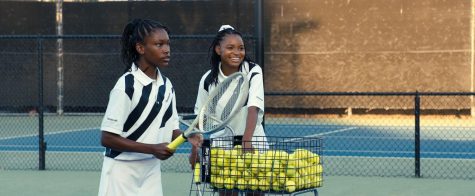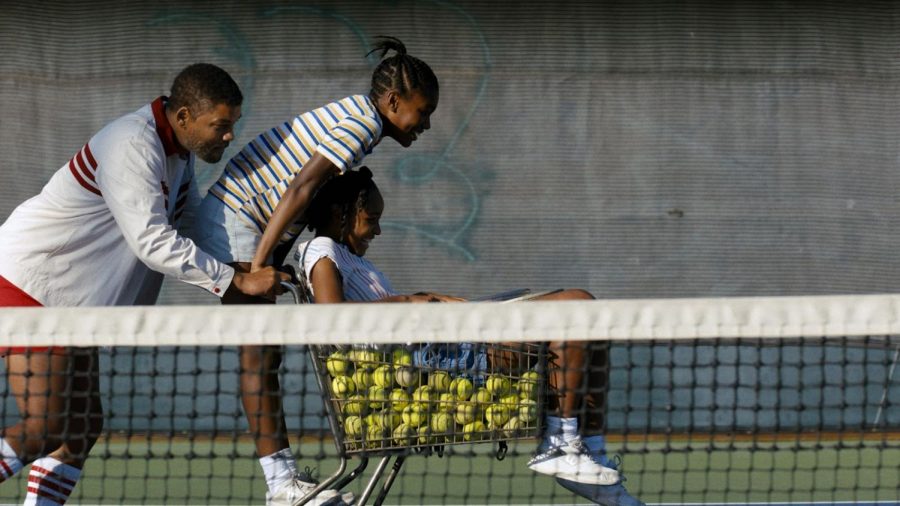Everyone knows the names Serena and Venus—the iconic sisters have accomplished practically everything one can within the realm of tennis. The list of awards they have won and the records they have broken cannot possibly fit into this article in a creative way, so I won’t even try.
This means that telling the Williams sisters’ story is no easy task, something that should be handled with grace and a serious attention to detail. Fortunately, “King Richard” rises up to the challenge in a commendable fashion, even though the movie is not necessarily about them.
Released in theaters and on HBO Max Nov. 19, “King Richard” is a biography of the Williams family, primarily told through the lens of Richard Williams (Will Smith), the father of Serena (Demi Singleton) and Venus (Saniyya Sidney). The movie deals with the upbringing of the sisters in Compton, California, where Richard and their mother Oracene (Aunjanue Ellis) attempt to train them to become tennis stars according to a 78-page plan, in which he outlines every small detail of their careers.
Throughout their time in Compton, we watch as Richard attempts to find a coach willing to take up the sisters’ training for free, while Oracene works double shifts as a nurse to put food on the table. We witness the five sisters bonding, the parents arguing and the family joking around, making the best of what they have.
Ultimately, this movie depends on the screen presence of Will Smith, who is equipped with the responsibility of bringing Richard’s larger-than-life persona to the silver screen. And larger than life he is, almost to the level of becoming a caricature of the titular character, were it not for the gut-wrenching emotion he also packs into his portrayal.
“[Smith] just took this film to another level,” Serena Williams said in a press conference with her sister, the stars, producers and director of the film that I attended.
It is true that the movie’s best moments are when we observe Smith simply being Richard, whether he’s openly opposing the advice star-coach Paul Cohen (Tony Goldwyn) gives Venus, or barging in on Venus’ interview when the interviewer pushes her to make an arrogant-sounding comment.
The reason Smith puts so much soul into this portrayal, though, goes further than his acting skills, which are more than honed at this point in his career. In the conference, he mentioned how seeing the aforementioned interview in real time made him fall in love with Richard Williams and even impacted his parenting at the time.
“The look on Venus’ face [when her father barged in] burned in my heart,” Smith said, about how he wanted his daughter to see him in that exact same light. “It was like she had a lion, and she was so confident and so comfortable that her lion wasn’t going to let anything happen to her.”

As entertaining and intriguing Richard is as a person, it is important to ask the question: why are we focusing on him—here I paraphrase the interviewer at the press conference—when we could have focused on two of the greatest athletes to have ever walked this Earth? This interrogation holds merit, because while the movie is as much about Venus’ rise to success (and Serena’s to a lesser extent) as Richard’s actions, the sisters’ journey is only emphasized in connection to their relationship with their “daddy.”
“This might be the greatest coaching story in the history of sports,” producer Trevor White said, emphasizing how the producers first viewed the concept of a movie about the Williams family. “But when we started to dive into their story, it was far beyond a coaching story. It was a story about a family. It was a story about love.”
The movie is almost self-aware in its decision to shine the spotlight on Richard, with Oracene, coach Rick Macci (Jon Bernthal) and others consistently criticizing him for acting as the “main character” within the pivotal conflicts of the movie. In a critical scene where Venus walks out in tears when her father does not let her compete so she can “live her childhood,” we see Oracene tear Richard a new one about how he is not the only person whose desires matter and how the success of Venus is not only the result of his “plan.” He has to be reminded to make room for what other people want, especially Serena and Venus.
I’m not here to criticize Richard Williams, but I am satisfied that the movie takes the time to acknowledge some of his uglier actions that admittedly come from a place of love. He is developed as a complex character with a traumatic past, who sometimes goes too far and sometimes refuses to compromise—but who’s always doing what he thinks is best for his children. He is sometimes framed as the antagonist of the story and must learn to shift his perspective, keeping the movie tense and intriguing.
However, this is not like any other parent-pushes-child story. It’s almost shoved down our throats that Venus and Serena loved tennis from the very start. Smith recounted a conversation he had with Venus, where she joked about how her parents must have brainwashed them into loving the game, and that their go-to punishment was not being able to play tennis.
“It was a fire coming from inside Venus and Serena,” Smith said. “Aligning with your children versus directing your children; that was a new parenting idea for me.”
On the theme of parenting, what is also commendable about this movie is the recognition Oracene Williams (now Price) receives. A figure as important as Richard—if not more—in the lives of her five daughters, Oracene is painted as a strong-willed, caring, fierce woman. Ellis always holds her own on the screen, which isn’t easy opposite the force that is Will Smith’s Richard.
“[The producers] insisted that Oracene would not be in the shadows,” Ellis said. “We tried to give her the presence she deserved to have.”
In the midst of all the family tensions and character conflicts, the movie could have easily forgotten to be a sports drama, but it does not. The tennis scenes are dynamic and fluid, making us move with the players, drawing us into the world of competition.
“I wanted to make a movie my mom could see, and she’s never seen a tennis match before,” director Reinaldo Marcus Green said. “But she understands what winning and losing is, what family is, what love is.”
In other technical aspects, the film also doesn’t disappoint. The pacing keeps the audience entertained through a long runtime, and the emotional punch provided by quality dialogue and talented direction made me, a person who doesn’t often cry at movies, teary-eyed on multiple occasions.
Last, but definitely not least, I want to mention the racial tensions portrayed in the movie. We witness the Williams family face several microaggressions, straight-up discriminatory actions and judgmental looks all throughout their journey in the white-dominated world that is tennis. These issues are tackled in a sensitive, delicate manner, but never without a humorous comment from Richard to lighten the situation, both for the audience and his kids. This doesn’t mean the movie doesn’t take such issues seriously, however; it just further shows how Richard and the Williams crew managed to navigate hard situations with smiles on their faces and passion in their eyes.
“King Richard” is as close to a perfect biography as possible. While there are some issues, such as certain pieces of dialogue feeling cliché at times, the movie combines all the best elements of sports dramas, family dramas and movies about racial and financial struggles and wraps it up in a bow appealing to all audiences. Go see for yourself the humble beginning of two of the best athletes alive.









